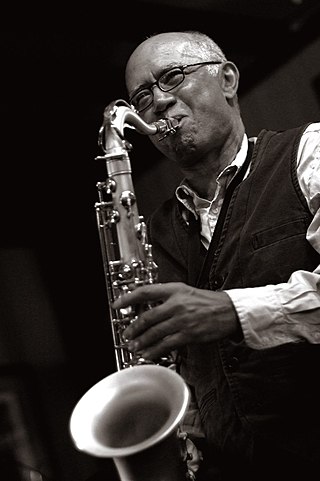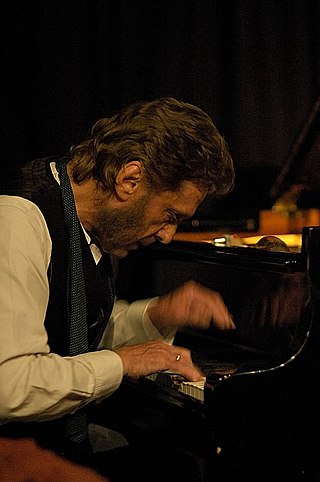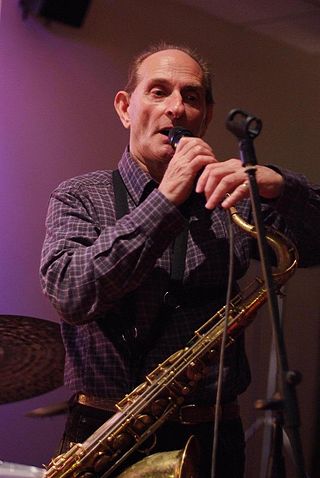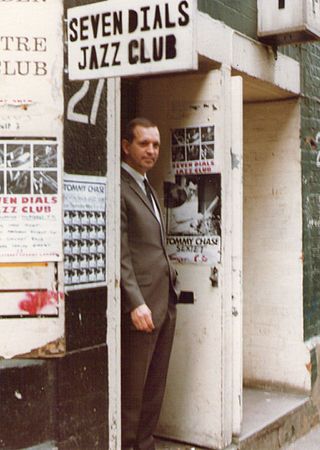
Frederick Dewayne Hubbard was an American jazz trumpeter. He played bebop, hard bop, and post-bop styles from the early 1960s onwards. His unmistakable and influential tone contributed to new perspectives for modern jazz and bebop.

John William Stevens was an English drummer, and a founding member of the Spontaneous Music Ensemble.

Gerald Joseph Mulligan, also known as Jeru, was an American jazz saxophonist, clarinetist, composer and arranger. Though primarily known as one of the leading jazz baritone saxophonists—playing the instrument with a light and airy tone in the era of cool jazz—Mulligan was also a significant arranger working with Claude Thornhill, Miles Davis, Stan Kenton, and others. His piano-less quartet of the early 1950s with trumpeter Chet Baker is still regarded as one of the best cool jazz ensembles. Mulligan was also a skilled pianist and played several other reed instruments. Several of his compositions including "Walkin' Shoes" and "Five Brothers", have become standards.

Kenneth Vincent John Wheeler, OC was a Canadian composer and trumpet and flugelhorn player, based in the U.K. from the 1950s onwards.

John Douglas Surman is an English jazz saxophone, clarinet, and synthesizer player, and composer of free jazz and modal jazz, often using themes from folk music. He has composed and performed music for dance performances and film soundtracks.

Arthur Edward George Themen is a British jazz saxophonist and formerly orthopaedic surgeon. Critic John Fordham has described him as "an appealing presence on the British jazz circuit for over 40 years.... Originally a Dexter Gordon and Sonny Rollins disciple ... Themen has proved himself remarkably attentive to the saxophone styles of subsequent generations."

Stanley William Tracey was a British jazz pianist and composer, whose most important influences were Duke Ellington and Thelonious Monk. Tracey's best known recording is the 1965 album Jazz Suite Inspired by Dylan Thomas's "Under Milk Wood", which is based on the BBC radio drama Under Milk Wood, by Dylan Thomas.

Elton Dean was an English jazz musician who performed on alto saxophone, saxello and occasionally keyboards. Part of the Canterbury scene, he featured in Soft Machine, among others.

Keith Graham Tippetts, known professionally as Keith Tippett, was a British jazz pianist and composer. According to AllMusic, Tippett's career "...spanned jazz-rock, progressive rock, improvised and contemporary music, as well as modern jazz for more than half-a-century". He held "an unparallelled place in British contemporary music," and was known for "his unique approach to improvisation". Tippett appeared and recorded in many settings, including a duet with Stan Tracey, duets with his wife Julie Tippetts, solo performances, and as a bandleader.

Ronnie Scott's Jazz Club is a jazz club that has operated in Soho, London, since 1959.
Alan Richard James Skidmore is an English jazz tenor saxophonist, and the son of saxophonist Jimmy Skidmore.

Peter John King was an English jazz saxophonist, composer, and clarinettist.

Robert Coull Wellins was a Scottish tenor saxophonist who collaborated with Stan Tracey on the album Jazz Suite Inspired by Dylan Thomas's "Under Milk Wood" (1965).
Michael Evans Osborne was an English jazz alto saxophonist, pianist, and clarinetist who was a member of the band Brotherhood of Breath in the 1960s and 1970s.
Donald Arthur Albert Weller was an English jazz musician, tenor saxophonist, and composer.
Thomas Henry Lowther is an English jazz trumpeter who also plays violin.
Simon Richard Spillett is a British jazz tenor saxophonist. He has won the BBC Jazz Awards Rising Star (2007), Jazz Journal's Critics' Choice album of the Year (2009), the British Jazz Awards Top Tenor Saxophonist (2011), and Services to British Jazz award (2016).

The Seven Dials Jazz Club opened its doors in 1980 as a venue for live music in Covent Garden, London. It hosted a range of artists and styles of jazz and began to attract a regular audience. Starting in 1983, a series of saxophone festivals was held on the premises each year.
Bryan Spring is a British jazz drummer. He is sometimes credited as Brian Spring.

Hoarded Dreams is a live album by bassist/composer Graham Collier featuring a composition commissioned for the Bracknell Jazz Festival by the Arts Council of Great Britain in 1983 and released on the Cuneiform label in 2007.














